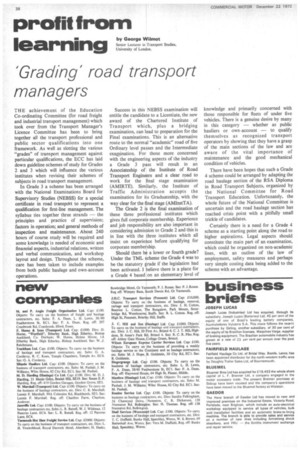profit from
Page 40

If you've noticed an error in this article please click here to report it so we can fix it.
learning by George Wilmot Senior Lecturer in Transport Studies, University of London.
'Grading' road transport managers
THE achievement of the Education Co-ordinating Committee (for road freight and industrial transport management) which took over from the Transport Manager's Licence Committee has been to bring together all the transport professional and public sector qualifications into one framework. As well as slotting the various "grades" of transport management against particular qualifications, the ECC has laid down guideline schemes of study for Grades 2 and 3 which will influence the various institutes when revising their schemes of subjects in road transport management.
In Grade 3 a scheme has been arranged with the National Examinations Board for Supervisory Studies (NEBSS) for a special certificate in road transpdrt to represent a qualification for first-line management. The syllabus ties together three strands — the principles and practice of supervision; factors in operation; and general methods of inspection and maintenance. About 240 hours of course study will be required and some knowledge is needed of economic and financial aspects, industrial relations, written and verbal communication, and workshop layout and design. Throughout the scheme, care has been taken to include examples from both public haulage and own-account operations. Success in this NEBSS examination will entitle the candidate to a Licentiate, the new award of the Chartered Institute of Transport which, plus a bridging examination, can lead to preparation for the Final examinations. This is an alternative route to the normal "academic" road of five Ordinary level passes and the Intermediate exwination. For those more concerned with the engineering aspects of the industry a Grade 3 pass will result in an Associateship of the Institute of Road Transport Engineers and a clear road to work for the final stage examination (AMIRTE). Similarly, the Institute of Traffic Administration accepts the examination for its Graduateship, with the way clear for the final stage (AMInstTA).
The Grade 2 is the final examination of these three professional institutes which gives full corporate membership. Experience and job responsibility are also important in considering admission to Grade 2 and this is in line with the three institutes which all insist on experience before qualifying for corporate membership.
Should there be a lower or fourth grade? Under the TML Scheme the Grade 4 was to be the statutory grade if the legislation had been activated. I believe there is a place for a Grade 4 based on an elementary level of knowledge and primarily concerned with those responsible for fleets of under five vehicles. There is a genuine desire by many in this category — whether as public hauliers or own-account — to qualify themselves as recognized transport operators by showing that they have a grasp of the main sections of the law and are aware of the vital importance of maintenance and the good mechanical condition of vehicles.
There have been hopes that such a Grade 4 scheme could be arranged by adapting the road haulage section of the RSA Diploma in Road Transport Subjects, organized by the National Committee for Road Transport Education. Unfortunately, the whole future of the National Committee is uncertain and the road haulage section has reached crisis point with a pitifully small trickle of candidates.
Certainly there is a need for a Grade 4 scheme as a starting point along the road to higher aspirations. Legal aspects should constitute the main part of an examination, which could be organized on non-academic lines, with an outline of the law of employment, safety measures and perhaps very simple costing data being added to the scheme with an advantage.












































































